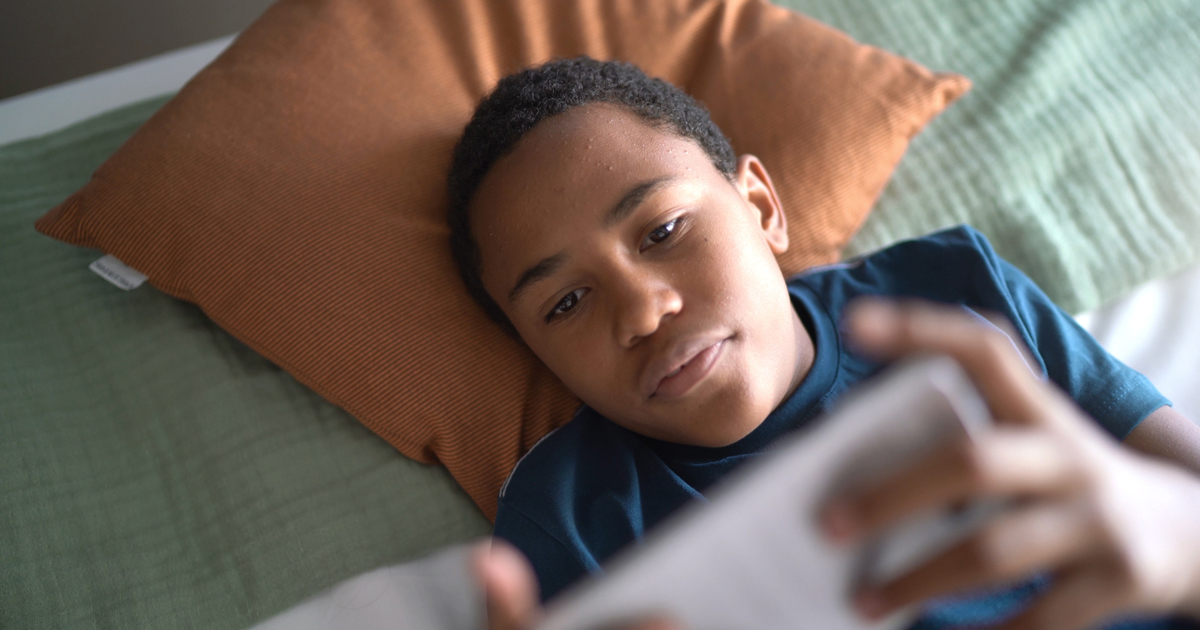Parents, help your teens protect their mental health with tech limits

Teens are under more social pressure than ever with the rise of virtual media platforms. According to the American Psychological Associations' (APA) annual Stress in America survey, 45% of parents say they feel disconnected from their families because of technology. More than half of parents say they worry about the influence of social media on their child's physical and mental health. What's a parent to do?
"The complete physical social isolation for teens during the pandemic is especially concerning," says Kimberly Vacek, PhD, Nebraska Medicine psychologist. "Rather than actual social interaction, they are interacting online, giving much more room to overanalyze, misperceive information and become distracted from being mindful of their internal world."
Parents often struggle with a healthy balance too. Since adolescent brains are still developing, it's especially important we take steps to help them set limits to protect their mental and physical health.
The impact of technology on teens
In a poll conducted by the organization Common Sense Media, 50% of teens reported that they felt they were addicted to their mobile devices, while 78% said that they check their digital devices hourly. Research shows that setting limits are helpful to decrease the negative impact of tech use, particularly in these areas:
Depression and anxiety
Studies link social media use to a decline in overall well-being, suggesting that time reduction decreased symptoms of depression and loneliness.
Even reducing the time by a half-hour per day is shown to significantly lower depression and anxiety symptoms. Studies assessing depression show a reduction after a digital detox regardless of how long the detox is practiced.
Sleep disturbances
It is well known that the use of technology before bed interferes with sleep quality. One study found that 70% of participants checked social media on their phones while in bed, with 15% spending an hour or more while in bed. Studies show that using social media in bed at night increased the likelihood of anxiety, insomnia and shorter sleep duration.
Social comparisons and stress levels
Research reports a connection between higher stress levels and checking social media posts often throughout the day. In addition, social comparisons can lead to lower self-esteem and a fear of missing out (FOMO). "Active use often leads to external validation or seeking approval from others, which can ultimately lead to self-scrutiny and self-loathing," says Dr. Vacek. "At extremes, especially in adolescents, active use can lead to ridicule or attack (cyberbullying)."
How parents can help their teens set healthy tech limits
Helping teens strike a health balance takes intention, patience and consistency. If you struggle with tech limits yourself, start by taking your own healthy steps to show your kids it can be done. Here are more tips from Dr. Vacek:
- Talk with them about how they are feeling. Ask them specific things about their day and avoid generalities (i.e. how was your day?). If they are closed off, make sure to let them know you care about knowing how they feel. Ask them what they need from you for support. Reassure them that whatever they do, no matter what, you'll love them and help them work through things
- Help them plan activities with you and with others – with and without tech. For example, invite friends over when your kids play video games even if they could play online. If there needs to be device time, do it together as a family instead of separately
- For younger teens, consider downgrading them from a smartphone to one that only allows simple phone and text. They may object, but this will significantly limit screen time and can help reduce the struggle that parents often experience
- For older teens, decide on the set amount of Wi-Fi time they get each day. Consider adding or subtracting based on positive or negative consequences. Give them strategies for managing difficult emotions when they don't have devices, which has become a coping strategy for many teens
- Instead of digital time, encourage activities like journaling, exercising, reading an actual book, drawing, learning a new hobby or talking with a trusted friend or counselor
- Create no-phone zones, particularly in the bedroom one hour before bedtime. Blue lights trick our brain into thinking it's not time to wind down. Another example is no phones at the dinner table, or for 30 to 60 minutes in the evening as a family
- An occasional digital detox may be a good practice to do as a family. Fill the time you would have spent on devices doing something active together
"If you're finding it difficult to disconnect from technology or are concerned about its impact on your teenager, please reach out to a mental health professional," says Dr. Vacek. "If it feels like digital influences may be negatively impacting your mental health, we are here to help."
Call 800.922.0000 if you'd like to set up an appointment.





